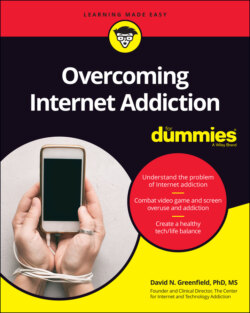Читать книгу Overcoming Internet Addiction For Dummies - David N. Greenfield - Страница 62
Thwarting normal development
ОглавлениеInternet addiction (and all addictions, for that matter) is a form of escapism, which thwarts the ability to learn in healthy ways. Addictions temporarily thwart the opportunity for real-life experiences and to learn from the natural consequences (positive, negative, and neutral) of various choices and behaviors, and overindulgence in anything that separates a person from balanced real-time living can hamper personal growth and development. It’s important to note that the Internet and screens themselves are not the issue here; it’s the powerful, mood-altering, and addictive pleasure that can skew healthy choices.
Most addictions tend to thwart normal development. Addiction has a way of sidetracking typical developmental milestones, especially around social, occupational, and academic pursuits. In the clinic where I work, it’s not uncommon to see patients who seem several years their junior with regard to developmental milestones and tasks, relative to their chronological age. They will have delays in normal things such as getting a driver’s license, dating, applying to college, or getting a job. One of the interesting changes I’ve seen from heavy Internet and screen use is the delay or avoidance of getting a driver’s license; one of the theories for this (which is more common than you might think) is there is less desire to go anywhere because everywhere comes to them online! Please keep in mind that even if such delays occur, it does not mean they won’t be able to get back on track, as many of our patients do — most addictions throw people off their normal developmental line, but many can and do get back on track.
At the residential and outpatient treatment centers where I work, I see the same scenario repeatedly: The patients do not, or cannot, master the challenges of growing up and becoming autonomous, self-regulating adults — in short, they have trouble launching into adulthood. Internet screen use can block the adolescent or young adult from mastering basic life skills; it creates developmental and neurobiological detours that impede growing up and limits their ability to experience the pleasures and responsibilities of adulting.
Addiction and delayed development create a vicious cycle. Impairment in frontal lobe activation impairs a person’s ability to perceive the risks or consequences of an addictive behavior, which, in turn, reduces their inhibitions to continue to engage in the addictive behavior. The person can then develop a heightened perception of invulnerability and a reduced appreciation for the consequences of their addictive behavior. This lack of appreciation of their behavior, and subsequent consequences, contribute further to the addiction cycle. This is an example of how denial and a lack of objectivity are a significant part of addiction.
Please recognize that much of this process is unconscious and largely neurobiological, and that often, normal stages of development, life stressors, trauma, and other medical or psychiatric issues can contribute to the potential for addiction. Many parents and loved ones assume that their child’s excessive or addictive use of technology is volitional when, in fact, it is not; although it may start as such, it can quickly degrade into a deeply addictive pattern of behavior with little self-awareness, often accompanied by denial. Parents often adhere to the belief that video games and screen use are under the conscious control of their child when nothing could be further from the truth. Their anger at their kids can be amplified by an erroneous assumption that their children should be able to control their screen use, when in many cases they can’t. This process can devolve into frequent struggles over technology, including fighting, hiding modems and devices, and inconsistent attempts to limit a child’s screen use. These techniques typically fail as there needs to be a more organized and consistent treatment plan in place to effect lasting change.
